Daily Vocabulary Words: List of Daily Used Words in Leading International Newspapers
Hi there. Welcome to this special section @ Wordpandit.
Our endeavour here is very simple: to highlight important daily vocabulary words, which you would come across in leading newspapers in the country. We have included the following newspapers in our selection:
• The New York Times
• The Washington Post
• Scientific American
• BBC
• The Guardian
• Psychology Today
• Wall Street Journal
• The Economist
We are putting in extensive work for developing your vocabulary. All you have got to do is be regular with this section and check out this post on a daily basis. This is your repository of words that are commonly used and essentially, we are posting a list of daily used words. Hence, this has significant practical application as it teaches you words that are used commonly in leading publications mentioned above.
Visit the website daily to learn words from leading international newspapers.
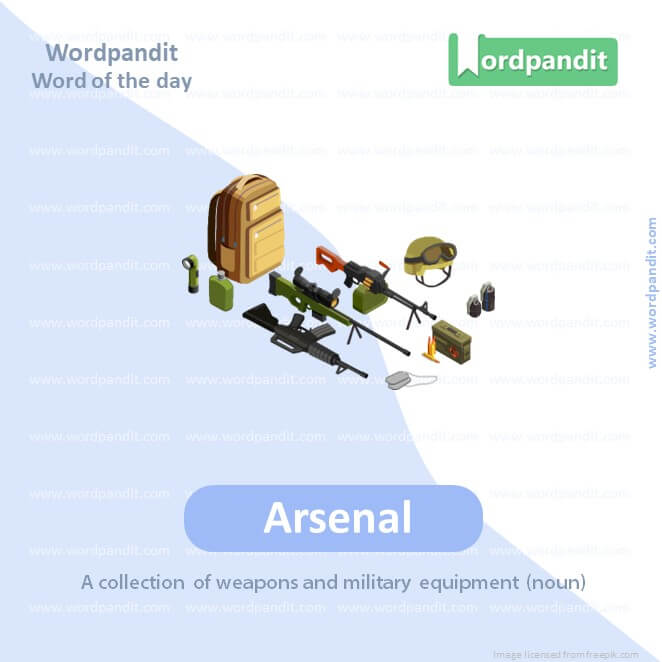
WORD-1: Arsenal
CONTEXT: The expansion of its nuclear arsenal, and its close friendships with Russia, Iran and North Korea.
SOURCE: Washington Post
EXPLANATORY PARAGRAPH: Imagine you have a big box where you keep all your favorite toys and things you need to play games. An arsenal is like that box, but instead of toys, it’s filled with weapons and things needed for fighting or protection.
MEANING: A collection of weapons and military equipment. (noun)
PRONUNCIATION: [ahr-suh-nl]
SYNONYMS: Armory, Cache, Stockpile, Repertoire, Arsenal, Depot, Storehouse
USAGE EXAMPLES:
1. The soldiers checked their arsenal before heading into battle.
2. He had an impressive arsenal of tools in his garage.
3. The museum displayed a historical arsenal from ancient times.
4. They built an arsenal to store the kingdom’s weapons.
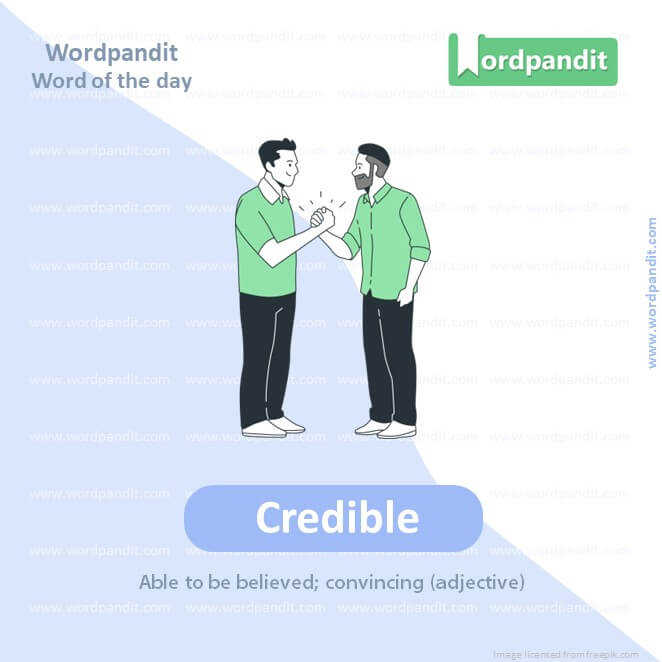
WORD-2: Credible
CONTEXT: China’s repression of its Uyghur minority in Xinjiang continues unabated, with credible new reports
SOURCE: Guardian
EXPLANATORY PARAGRAPH: When you tell a story and your friends believe it because it sounds real and true, that means your story is credible. It’s like saying something is believable or trustworthy.
MEANING: Able to be believed; convincing. (adjective)
PRONUNCIATION: [kred-uh-buhl]
SYNONYMS: Believable, Plausible, Trustworthy, Reliable, Convincing, Dependable
USAGE EXAMPLES:
1. She gave a credible reason for being late.
2. The witness was credible in court.
3. They needed credible evidence to prove the theory.
4. His story didn’t seem credible to the police.
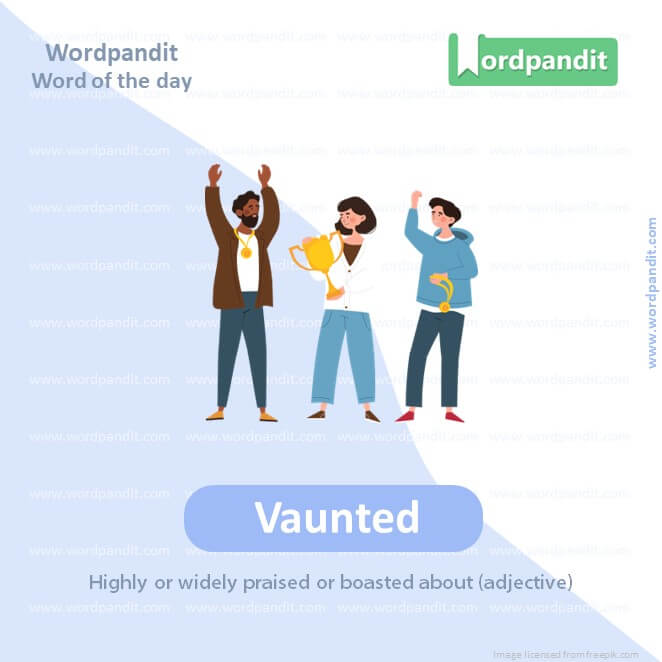
WORD-3: Vaunted
CONTEXT: Beijing’s curtailing of freedoms in Hong Kong has been unrelenting, with the city’s once-vaunted judicial system
SOURCE: Guardian
EXPLANATORY PARAGRAPH: Imagine someone talking a lot about how great they are at something, like being the best at a video game. Vaunted means someone is bragging or showing off about something a lot.
MEANING: Highly or widely praised or boasted about. (adjective)
PRONUNCIATION: [von-tid]
SYNONYMS: Boasted, Praised, Acclaimed, Celebrated, Hyped, Exalted
USAGE EXAMPLES:
1. The team’s vaunted defense failed to stop the opponent.
2. She lived up to her vaunted reputation as a great singer.
3. His vaunted achievements were the talk of the school.
4. The vaunted new technology had many flaws.
WORD-4: Profligate
CONTEXT: One of the world’s most profligate jailers of journalists and human rights lawyers.
SOURCE: Guardian
EXPLANATORY PARAGRAPH: Imagine someone using lots of their money or things carelessly, like buying lots of toys they don’t need. Profligate means someone is spending too much or using too much of something without thinking.
MEANING: Recklessly extravagant or wasteful in the use of resources. (adjective)
PRONUNCIATION: [prof-li-git]
SYNONYMS: Wasteful, Extravagant, Spendthrift, Imprudent, Reckless, Squandering
USAGE EXAMPLES:
1. His profligate spending left him in debt.
2. The company was criticized for its profligate use of water.
3. They led a profligate lifestyle with lavish parties.
4. The profligate prince wasted his fortune.
WORD-5: Hyperbole
CONTEXT: A recalibration based on reality, not hyperbole, will make the world a bit safer.
SOURCE: Guardian
EXPLANATORY PARAGRAPH: Hyperbole is when you say something in a really exaggerated way to make it sound much bigger or more exciting than it really is. Like saying, “I’m so hungry I could eat a horse!” even though you can’t really eat a whole horse.
MEANING: Exaggerated statements or claims not meant to be taken literally. (noun)
PRONUNCIATION: [hy-pur-buh-lee]
SYNONYMS: Exaggeration, Overstatement, Embellishment, Amplification, Inflation, Stretch
USAGE EXAMPLES:
1. “I’ve told you a million times” is a hyperbole.
2. She used hyperbole to make her point.
3. His story was full of hyperbole to entertain us.
4. Hyperbole is a common figure of speech.
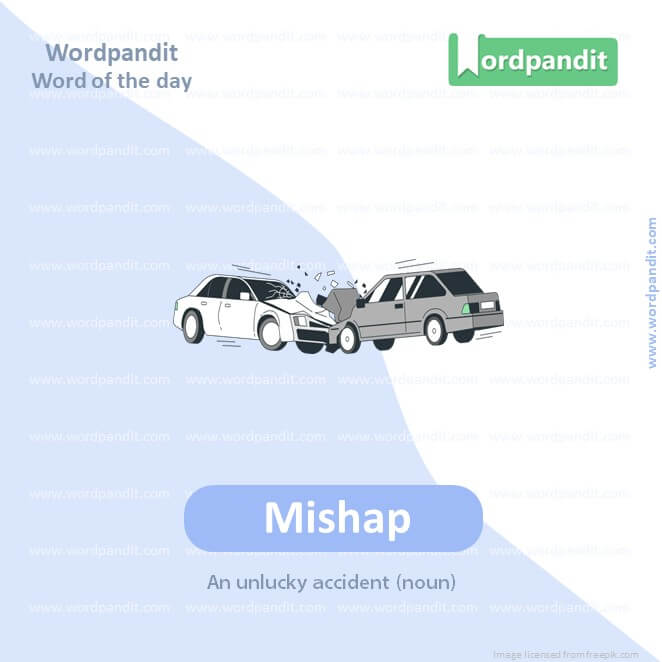
WORD-6: Mishap
CONTEXT: To find ways to deal with some sudden conflict or mishap between the planes or ships of the two countries.
SOURCE: Washington Post
EXPLANATORY PARAGRAPH: A mishap is like a small accident or mistake that happens when you don’t expect it. Like when you spill your juice by accident or trip while playing. It’s not really serious, but it’s something that went wrong.
MEANING: An unlucky accident. (noun)
PRONUNCIATION: [mish-ap]
SYNONYMS: Accident, Misfortune, Blunder, Error, Slip-up, Setback
USAGE EXAMPLES:
1. The picnic was spoiled by a mishap with the grill.
2. She had a minor mishap while driving.
3. There was a mishap during the performance.
4. They laughed off the small mishap.
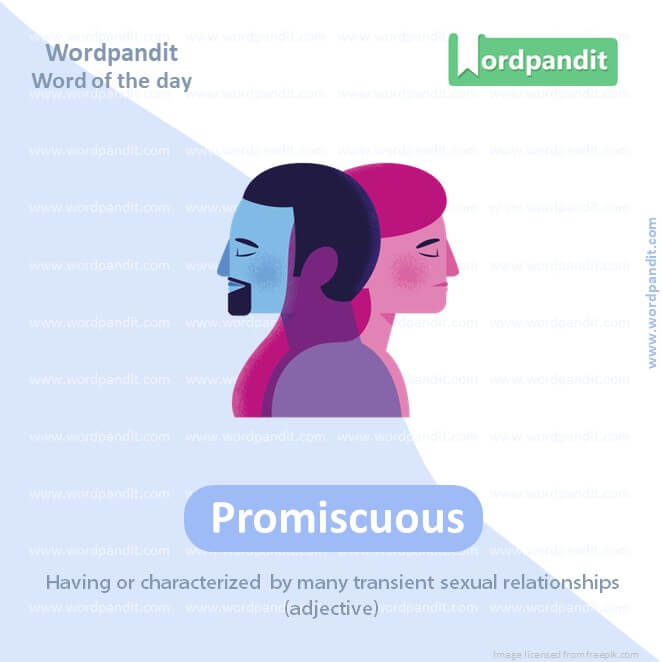
WORD-7: Promiscuous
CONTEXT: One bemused administration official dubbed it “promiscuous engagement.
SOURCE: Washington Post
EXPLANATORY PARAGRAPH: Promiscuous is a word used for someone who has lots of boyfriends or girlfriends, or doesn’t stick to just one friend. It’s like having too many friends and not choosing just one best friend.
MEANING: Having or characterized by many transient sexual relationships. (adjective)
PRONUNCIATION: [pro-mis-kyoo-uhs]
SYNONYMS: Indiscriminate, Unselective, Casual, Loose, Easy, Libidinous
USAGE EXAMPLES:
1. He had a reputation for being promiscuous.
2. The study focused on promiscuous behavior in teenagers.
3. Her promiscuous past was a topic of gossip.
4. Promiscuous attitudes were common in that era.
WORD-8: Noteworthy
CONTEXT: That meeting 30 years ago was noteworthy in a second, even more important way
SOURCE: Washington Post
EXPLANATORY PARAGRAPH: When something is really interesting or important, like getting a big trophy or seeing a huge rainbow, that’s called noteworthy. It’s so special or different that people should notice it or talk about it.
MEANING: Worthy of attention or notice; remarkable. (adjective)
PRONUNCIATION: [noht-wur-thee]
SYNONYMS: Remarkable, Notable, Significant, Important, Memorable, Outstanding
USAGE EXAMPLES:
1. Her achievement was noteworthy.
2. The book gained noteworthy success.
3. There were several noteworthy events this year.
4. The artist’s work is noteworthy for its uniqueness.
WORD-9: Untapped
CONTEXT: Business leaders had come to see China as the world’s last major untapped market.
SOURCE: Washington Post
EXPLANATORY PARAGRAPH: Imagine a box of toys you’ve never played with or a book you’ve never read. Untapped is like that. It means something that has a lot of good things or uses, but no one has used it or discovered it yet.
MEANING: Not yet exploited or used. (adjective)
PRONUNCIATION: [uhn-tapd]
SYNONYMS: Unexploited, Unused, Undeveloped, Unutilized, Unexplored, Dormant
USAGE EXAMPLES:
1. The untapped potential of solar energy is vast.
2. They explored untapped markets for their products.
3. He had untapped talents as a writer.
4. The region’s untapped resources were vast.
WORD-10: Flocking
CONTEXT: Europe and Japan began flocking there to set up operations.
SOURCE: Washington Post
EXPLANATORY PARAGRAPH: Flocking is like when a lot of birds come together in a group. It can also mean a lot of people going to the same place at the same time, like when everyone runs to see a cool new toy in the store.
MEANING: Gathering or moving together in a large group. (verb)
PRONUNCIATION: [flok-ing]
SYNONYMS: Gathering, Congregating, Assembling, Herding, Thronging, Cluster
USAGE EXAMPLES:
1. Tourists were flocking to the beach.
2. Birds were flocking to the feeder.
3. People started flocking to the new restaurant.
4. Fans were flocking to the concert venue.
vocabulary pronounce
The art of communication opens up a world of opportunities. However, to glide smoothly through this realm, it is crucial to not only understand the ‘vocabulary pronounce’ but also to exercise precision when using it. The task of acquiring a rich vocabulary and impeccable pronunciation might seem daunting, but there are proficient ways to conquer this hurdle.
While individuals may have a vast vocabulary, it is the ‘vocabulary pronounce’ that truly dictates the overall clarity and comprehension of their messages. Pronunciation is the essence that brings the words, the bricks in the wall of language, to life. Hence, learning proper pronunciation is vital for anyone aiming to achieve excellence in any language.
When delving into ‘vocabulary pronounce’, one should adopt an interactive and immersive approach rather than a theoretical one. Listening and practicing are pillars to gain command over the ‘vocabulary pronounce’. A balance of both can go a long way in improvising and refining one’s language skills. So, it’s advisable to regularly listen to podcasts or watch videos featuring native speakers. These mediums are a treasure trove of right pronunciation, intonation, and pause.
An excellent way to approach learning ‘vocabulary pronounce’ is also to break down complicated or lengthier words into smaller, manageable bits. By doing this, each syllable can be enunciated accurately, promoting correct pronunciation. This technique can significantly reduce the intimidation of difficult words and enhance a learner’s confidence and fluency.
Remember, ‘vocabulary pronounce’ is a lifelong journey and not a destination. Hence, investing time for consistent practicing, learning new words, and understanding their correct pronunciation should be part and parcel of one’s daily routine. Technology, with its various apps and programs, is a helpful ally in this quest.
To conclude, understanding and mastering ‘vocabulary pronounce’ are indeed challenging feats but with the right strategies and diligent practice, they are readily achievable, leading to robust language skills and heightened communication abilities.













